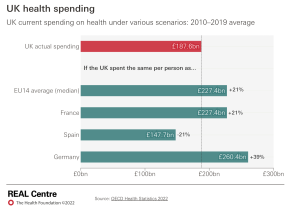10 evidence based reasons for sustained rises in NHS funding –
- More than expected, but half the sum needed, the Autumn rise in NHS funding (£3.3bn) was well short of the £7bn sum that NHS England said was necessary to cope with inflation, energy and other costs for the period up and until 2024/25.
- “in real terms, core day-to-day spending on the NHS will rise by 2% a year by 2024/25, while capital spending will grow by just 0.2%”. This figure falls well short of the 3.6% average annual rises given to the NHS since its launch in 1948 according to a recent Health Foundation analysis.
- How much sustained funding is needed? Compelling evidence supports funding rises of 3-4% over the next decade. Back in 2018 the Institute of Financial Studies calculated that the NHS will need an extra 3.3% in funding a year for the next 15 years just to keep pace with cost pressures such as the rising numbers of older people and those living with chronic disease, but this figure takes no account extra costs from the pandemic or the impact of higher than expected prices.
- Funding to solve the workforce crisis is still missing from the NHS budget. The cost of the long awaited workforce strategy, which is expected in March 2023, but has been promised since 2017, will need to make realistic estimates of future staffing needs, and be backed by substantial extra funding.
- Also missing from NHS leaders’ current budgets is the money to resolve the current pay crisis, which will be crucial to tackling waiting lists and influential in retaining existing staff.
- Strong signs of financial pressure are already evident across the NHS, affecting decisions about what services can be afforded and raising the likelihood of cuts. Two thirds of the Integrated Care Services (local NHS commissioners) are already facing a £1.3bn deficits. Whilst hospital trusts are on course for a combined deficit of £2bn.
- The cost of delayed maintenance and repairs to England’s hospitals has rocketed from under £6bn in 2019 to £10.2bn in 2022, Half a dozen hospitals were built in the 1970s with defective concrete planks that are now a structural threat. Over the last decade capital cash strapped hospitals consistently reallocated capital funding to meet the day to day running costs in the NHS, the recent increase of 0.2% in real terms is therefore insufficient to meet the size of the backlog.
- How does NHS funding compare internationally? Average health spending in the UK between 2010 and 2019 was £3,005 per person – 18% below the EU14 average of £3,655. Matching the spending per head of France or Germany would have meant an extra £40bn and £73bn (21% to 39% increase respectively) available to spend on UK healthcare.
- New investment in prevention will help to control future health costs, however public health budgets have been cut by 24% on a real-terms per person basis since 2015/16. The NHS spends around 10% of its budget on treating diabetes – and 80% of that goes on the complications from the disease, In a Diabetes UK survey of 10,000 people with diabetes, “1 in 3 respondents had no contact with their diabetes healthcare team in 2021. Workforce shortages are a major driver of this disruption.”
- A long term plan to consistently to increase NHS funding over the next decade is crucial, to raise NHS capacity and provide more care. This is a key (but not the only) driver to improving access and standards. Only 10% of the public think the government has the right policies on the NHS – 82% believe funding should be increased and roughly the same percentage think the NHS should be funded primarily through taxation.

Dear Reader,
If you like our content please support our campaigning journalism to protect health care for all.
Our goal is to inform people, hold our politicians to account and help to build change through evidence based ideas.
Everyone should have access to comprehensive healthcare, but our NHS needs support. You can help us to continue to counter bad policy, battle neglect of the NHS and correct dangerous mis-infomation.
Supporters of the NHS are crucial in sustaining our health service and with your help we will be able to engage more people in securing its future.
Please donate to help support our campaigning NHS research and journalism.


